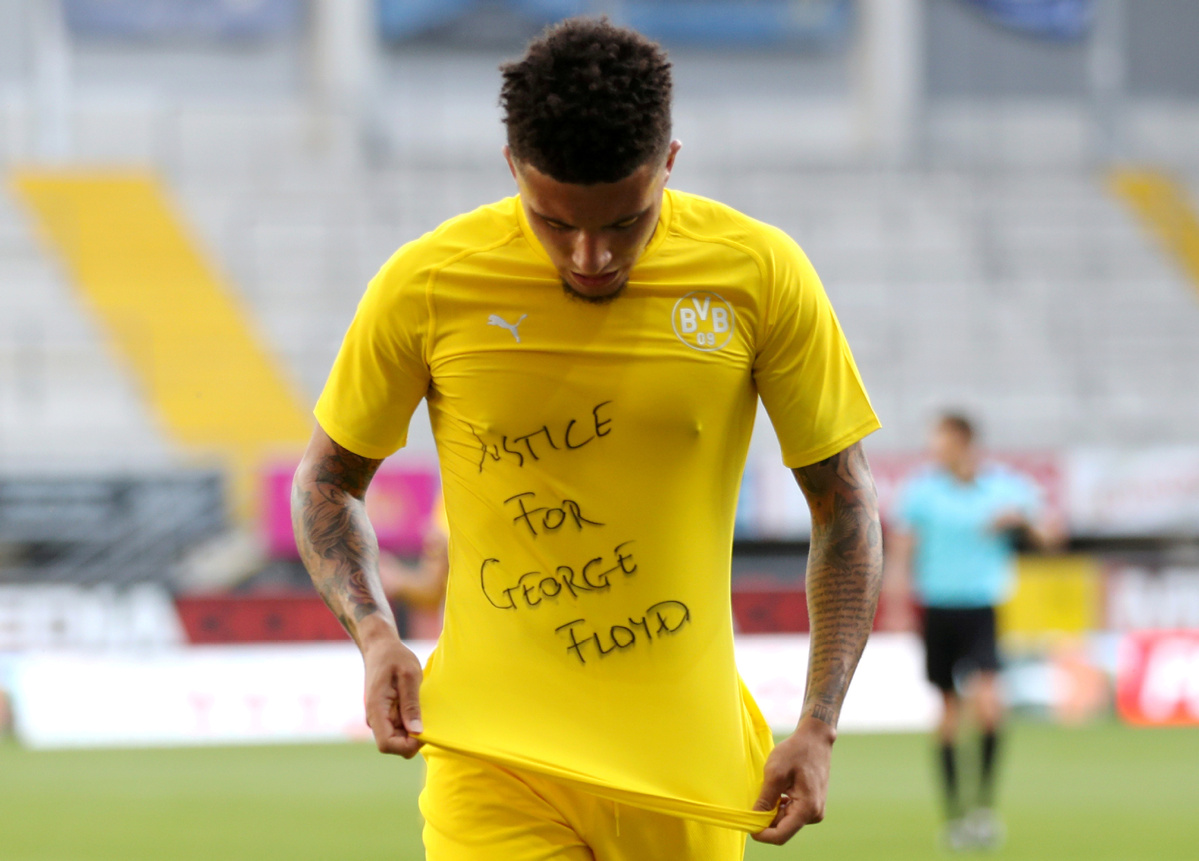Sports world speaks out for racial equality
By JONATHAN POWELL in London | China Daily Global | Updated: 2020-06-15 10:56

Sports people and sporting bodies have spoken out since the death of George Floyd in police custody in the United States on May 25, marking signs of change in an industry that is occasionally held up as a mirror of society.
Floyd, a black man, died in Minneapolis, Minnesota, after a white police officer pressed his knee on the arrested man's neck for nearly nine minutes.
Hundreds of thousands have protested in cities across the world over the death, in solidarity with the Black Lives Matter movement, and against police brutality, despite concerns about the spread of the novel coronavirus.
Professional athletes, leagues and teams are also stepping forward and taking a stand.
The soccer community in England has been outspoken, with England and Manchester City star forward Raheem Sterling leading the way by appearing on the BBC's flagship Newsnight program and saying that supporting the movement was the "right thing to do", regardless of its consequences for his career.
"The only disease right now is the racism that we are fighting," said Sterling, 25. "This is the most important thing at this moment because this is something that is happening for years and years. Just like the pandemic, we want to find a solution to stop it."
In addition, Sterling said, "We need to actually implement change and highlight the places that do need changes."
In 2016, National Football League star Colin Kaepernick famously "took a knee" during the US national anthem, to protest police brutality. He hasn't played in the league since.
On June 5, after 10 days of protests across the nation, the NFL's top executive, Commissioner Roger Goodell, said the US organization had made mistakes in not previously listening to players on the issue.
Sterling said his sport must use the moment to step up the drive for diversity.
He also said taking the knee is an important gesture but the game must properly address the lack of ethnic minority representation in leadership roles.
Some English Premier League soccer squads have taken the knee in training, while England's Jadon Sancho revealed a T-shirt saying "Justice for George Floyd" after scoring for Borussia Dortmund in Germany. The English Football Association has said it will support similar demonstrations set to take place when matches restart on Wednesday.
Formula One racing driver Lewis Hamilton endorsed the movement with an impassioned outburst on social media, even castigating his sport for steering clear of the subject altogether.
"I see those of you staying silent," Hamilton wrote on Instagram, "some of you the biggest stars yet you stay silent in the midst of injustice."
Billie Jean King, a 1960s and '70s tennis icon, told BBC she believed the virus pandemic has caused people to experience "grief and anger for all kinds of reasons" and has generated a more robust empa-thy for all issues of injustice.
"For the first time, people are listening to black people, and I feel this is our opportunity to forever change our culture and make the world a better place," King said.
Current tennis stars Naomi Osaka and Coco Gauff also have spoken out.
Guardian newspaper columnist Jonathan Liew said some sports organizations' statements on the issue still come across as "closer to obligation than any commitment to social justice", and called on them to do more.
In his column, Liew said: "There's a distinction to be drawn between speaking out, and speaking for the sake of it. Speaking for attention.
"This is a cause too important to be hijacked by corporate insincerity. Sports teams and organizations are not uniquely culpable for the deep well of injustice that led to Floyd's death.... But many inspire a loyalty and identity that most companies can never hope to match. People will follow, if only they would lead."
John Amaechi, a British former National Basketball Association player who is now a consultant and psychologist, also called on sports bodies to take on more responsibility.
He told Sky Sports News: "Sport is a human right; we will not tolerate discrimination. ... Follow your rules, fulfill your promises, and understand your organization and its construction of what's holding people back."
Chris Grant, a board member of the governing body Sport England, said it was crucial that sports people use their voice. Grant is pushing for a reconciliation commission to tackle racism in Britain that would take a historic perspective and look at the roots of inequality.
"A lot of these problems have grown quietly over the decades," he said. "Now is our opportunity to understand them and fix them."























